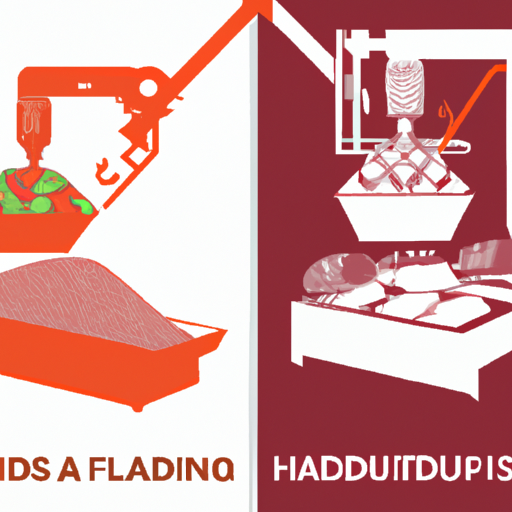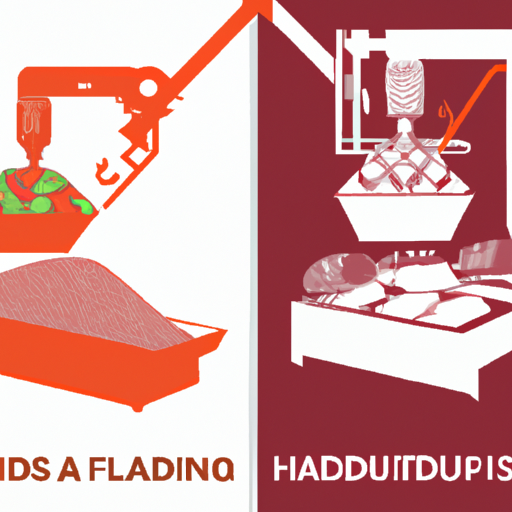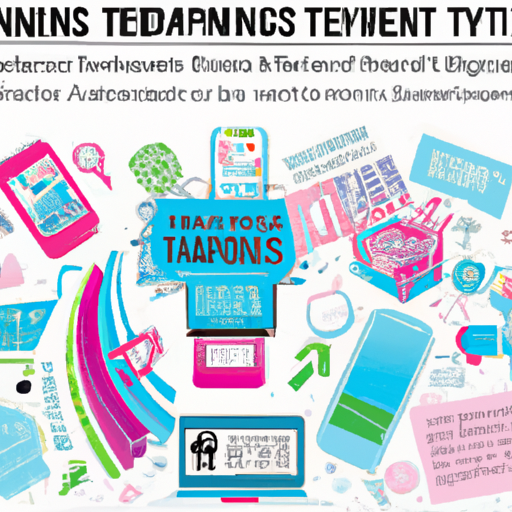Food Processing Industry Trends
So you’re curious about the latest trends in the food processing industry, huh? Well, you’ve come to the right place! In this article, we will take a closer look at the ever-evolving world of food processing and explore the top trends that are shaping the industry. From innovative technologies to shifting consumer preferences, get ready to discover what’s hot and happening in the dynamic world of food processing. So grab a snack and let’s dig in!

Table of Contents
Technological Advancements
Automation and Robotics
The food processing industry is witnessing a major transformation with the advancements in automation and robotics. Automation technologies such as robotic arms, automated sorting systems, and packaging machines have revolutionized the production process, Increasing efficiency and reducing labor costs. These technologies not only improve the speed and accuracy of tasks but also enhance food safety by minimizing human errors and contamination risks. With the introduction of smart sensors and machine learning algorithms, robots can now handle delicate food items without causing damage. Moreover, the integration of artificial intelligence (AI) into robotics enables machines to learn and optimize their performance over time, leading to improved productivity and quality control.
Internet of Things (IoT)
The Internet of Things (IoT) has become a driving force in the food processing industry. By connecting various devices and equipment, IoT enables real-time monitoring, data collection, and analysis, resulting in improved operational efficiency and informed decision-making. IoT sensors can monitor critical parameters such as temperature, humidity, and storage conditions, ensuring optimal food quality and safety throughout the supply chain. By tracking inventory levels and expiration dates, IoT systems help prevent excessive food waste and enhance inventory management. Furthermore, IoT enables predictive maintenance, reducing downtime and minimizing unexpected equipment failures.
Artificial Intelligence (AI)
Artificial intelligence (AI) has had a profound impact on the food processing industry, revolutionizing various aspects of the production and distribution process. AI-driven algorithms can analyze vast amounts of data, including consumer preferences, market trends, and production data, to predict demand patterns and optimize production schedules. AI can also be used to enhance food safety by detecting and flagging potential contamination or spoilage risks. Additionally, AI-powered chatbots and virtual assistants are being used to improve customer service and personalize the shopping experience. With AI, food processing companies can streamline their operations, increase efficiency, and deliver products that align with consumer demands.
Blockchain Technology
Blockchain technology is making waves in the food processing industry by ensuring transparency, traceability, and trust in the supply chain. By utilizing a decentralized and immutable ledger, blockchain enables the tracking of every transaction and movement of products throughout the supply chain. This technology is particularly beneficial in addressing food safety issues, such as outbreaks or recalls, as it allows for swift identification of the source and scope of the issue. Additionally, blockchain can help verify the authenticity and origin of ingredients or finished products, supporting claims of sustainability or fair trade practices. By enabling consumers to access real-time information about the products they purchase, blockchain promotes transparency and builds trust between consumers and food processing companies.
Data Analytics
The abundance of data generated in the food processing industry presents both opportunities and challenges. Data analytics allows companies to extract valuable insights from this data, enabling them to make informed decisions and optimize their operations. By analyzing consumer preferences and behaviors, companies can develop targeted marketing strategies and launch products that meet the evolving demands of their customers. Furthermore, data analytics can improve production efficiency by identifying bottlenecks, optimizing inventory levels, and reducing waste. Advanced analytics tools, such as machine learning algorithms, help in predicting product quality, shelf life, and market demand, aiding in better resource allocation and supply chain management.
Sustainability Initiatives
Reducing Food Waste
Reducing food waste is a top priority for the food processing industry due to its significant environmental and economic impacts. Companies are implementing measures to minimize waste at various stages, from production to distribution and consumption. Improved inventory management systems, coupled with data analytics, help identify and reduce waste caused by overproduction or inefficient supply chain practices. Smart packaging solutions, such as modified atmosphere packaging, extend the shelf life of products, reducing spoilage and waste. Additionally, companies are partnering with food banks and non-profit organizations to redirect surplus food to those in need, further reducing waste and addressing food insecurity.
Energy Efficiency
Energy consumption is a major concern in the food processing industry, as it contributes to both environmental impact and operational costs. To reduce energy consumption, companies are adopting energy-efficient technologies and practices. These include the use of energy-efficient equipment, such as high-efficiency motors and heat recovery systems, and the implementation of energy management systems. Companies are also investing in renewable energy sources, such as solar panels or biomass boilers, to power their operations. Furthermore, energy monitoring and data analytics help identify energy-saving opportunities and optimize energy usage throughout the production process.
Environmentally Friendly Packaging
Packaging plays a crucial role in the food processing industry, ensuring product safety, shelf life, and convenience. However, the excessive use of plastic and non-recyclable materials in packaging raises environmental concerns. In response to this, companies are adopting environmentally friendly packaging solutions. These include the use of biodegradable or compostable materials, such as plant-based plastics or paperboard, which reduce the environmental impact compared to conventional packaging. Companies are also exploring alternative packaging methods, such as active packaging or edible coatings, which help extend the shelf life of products without compromising quality or safety.
Sustainable Sourcing
Sustainable sourcing is a key aspect of the food processing industry’s sustainability initiatives. Companies are increasingly focusing on responsible sourcing practices that prioritize environmental stewardship, social responsibility, and animal welfare. This includes sourcing ingredients from certified sustainable farms or fisheries that adhere to strict environmental and ethical standards. Companies are also investing in supply chain transparency, utilizing technologies like blockchain to track and verify the origin and sustainability credentials of their ingredients. By promoting sustainable sourcing practices, the food processing industry can contribute to the preservation of natural resources and support local communities.
Healthy and Functional Foods
Clean Label Products
Consumers are increasingly seeking clean label products, which contain minimal artificial additives, preservatives, or unfamiliar ingredients. Food processing companies are responding to this demand by reformulating their products and emphasizing natural and recognizable ingredients on their labels. This includes removing artificial colors, flavors, and sweeteners, and replacing them with natural alternatives. Companies are also replacing chemical preservatives with natural alternatives like rosemary extract or citric acid. By offering clean label products, companies cater to health-conscious consumers and address concerns about the potential health risks associated with artificial additives.
Plant-Based Alternatives
The growing popularity of plant-based diets has prompted the food processing industry to develop a wide range of plant-based alternatives to traditional animal-based products. From plant-based burgers and sausages to dairy-free milk and cheese, companies are utilizing innovative ingredients and processing techniques to replicate the taste and texture of animal-based products. This not only caters to the increasing number of vegetarians and vegans but also appeals to flexitarians who are looking to reduce their meat consumption for health or environmental reasons. The development of plant-based alternatives allows food processing companies to tap into new markets and meet the evolving dietary preferences of consumers.
Probiotics and Prebiotics
Probiotics and prebiotics have gained considerable attention in recent years due to their potential health benefits. Probiotics are live bacteria or yeast that improve gut health, while prebiotics are dietary fibers that stimulate the growth of beneficial bacteria in the digestive system. Food processing companies are incorporating probiotics and prebiotics into a wide range of products, including yogurts, fermented foods, and dietary supplements. This enables consumers to enhance their digestive health and support their immune systems through everyday food choices. By offering products enriched with probiotics and prebiotics, food processing companies tap into the growing demand for functional foods that promote overall wellness.
Functional Beverages
Functional beverages, also known as “nutraceuticals,” are gaining popularity among health-conscious consumers. These beverages are formulated with ingredients that offer additional health benefits beyond hydration or refreshment. Food processing companies are developing functional beverages that target specific health concerns, such as energy drinks for improved focus or sports drinks for enhanced performance. Functional beverages may contain ingredients like vitamins, antioxidants, herbal extracts, or probiotics, which provide various health-promoting properties. By offering functional beverages, companies cater to consumers’ desire for convenient and accessible ways to improve their health and well-being.
Convenience and Ready-to-Eat Foods
Meal Kits
Meal kits have become increasingly popular, offering convenience and variety to time-constrained individuals or those with limited culinary skills. These kits include pre-portioned ingredients and recipe instructions, allowing consumers to easily prepare restaurant-quality meals at home. Food processing companies are tapping into this trend by offering their own branded meal kits or partnering with established meal kit companies. By providing consumers with pre-prepared and portioned ingredients, companies cater to the demand for convenient and time-saving meal solutions, while also ensuring a level of quality and freshness that can be expected from reputable food processing companies.
Snack Packaging Innovations
Snacking has become an integral part of modern lifestyles, with consumers constantly seeking convenient and on-the-go options. Food processing companies are responding to this trend by introducing innovative snack packaging solutions that offer convenience, portion control, and extended product freshness. Packaging designs such as resealable pouches, single-serve packs, or snack-sized containers ensure that snacks remain fresh and portable. Additionally, companies are increasingly using sustainable packaging materials, such as compostable films or recycled materials, to align with consumer preferences for environmentally friendly options. Snack packaging innovations not only enhance convenience but also contribute to reducing food waste and environmental impact.
Frozen Foods
Frozen foods continue to be popular among consumers due to their convenience, extended shelf life, and availability of a wide range of options. Food processing companies are continuously innovating in the frozen food category, offering healthier and more diverse options to cater to evolving consumer preferences. These include frozen meals with cleaner ingredient lists, plant-based frozen options, and a focus on reducing sodium levels. The application of advanced freezing technologies ensures that the nutritional quality and taste of frozen foods are maintained. By providing high-quality frozen options, food processing companies meet the demand for convenient, time-saving, and nutritious meal solutions.
Convenient Packaging Solutions
Convenience is a key driver in the food processing industry, and companies are constantly looking for innovative packaging solutions to enhance the convenience factor for consumers. This includes packaging formats that enable easy opening, portion control, and on-the-go consumption. Convenient packaging solutions may include microwaveable trays, resealable pouches, or individual serving sizes. Food processing companies also invest in packaging designs that simplify food preparation, such as pre-cut vegetables or ready-to-cook marinades. By offering packaging solutions that prioritize convenience, companies cater to the busy lifestyles of consumers and provide them with hassle-free options for their meal and snack choices.
E-commerce and Direct-to-Consumer
Online Grocery Shopping
The rise of e-commerce has transformed the way consumers purchase groceries. Online grocery shopping enables customers to conveniently order their groceries from the comfort of their homes and have them delivered to their doorsteps. Food processing companies are embracing this trend and partnering with e-commerce platforms or launching their own online stores to offer direct-to-consumer options. This allows companies to reach a wider customer base and offer personalized recommendations based on consumer preferences. Additionally, online grocery shopping provides valuable data insights into consumer behavior and preferences, enabling companies to further tailor their products and marketing strategies.
Subscription Meal Services
Subscription meal services have gained popularity as a convenient and cost-effective way for consumers to access prepared meals or meal kits on a recurring basis. Food processing companies are capitalizing on this trend by collaborating with subscription meal service providers or launching their own subscription-based offerings. By providing consumers with regular deliveries of ready-to-eat meals or meal kits, companies simplify meal planning and offer a consistent and personalized experience. Subscription meal services also allow companies to gather valuable customer feedback and data, facilitating continuous improvement and innovation in their product offerings.
Direct-to-Consumer Brands
Food processing companies are increasingly exploring the direct-to-consumer (D2C) model, bypassing traditional retail channels and establishing their own online presence. D2C brands allow companies to maintain direct relationships with consumers, gather data insights, and offer personalized experiences. By selling directly to consumers, companies can maintain control over their brand image, pricing, and customer service. D2C brands also enable companies to launch new products or test market demand without the need for intermediaries. By establishing D2C channels, food processing companies can build a loyal customer base and adapt quickly to changing consumer preferences and emerging trends.
Meal Delivery Apps
Meal delivery apps have revolutionized the food industry, offering consumers access to a wide variety of cuisines and meal options with just a few taps on their smartphones. Food processing companies are partnering with meal delivery apps to expand their reach and cater to the growing demand for delivery services. These apps allow companies to provide consumers with freshly prepared meals or meal kits delivered to their homes or workplaces. By leveraging the popularity of meal delivery apps, food processing companies can tap into the convenience-seeking consumer segment and offer them a seamless and enjoyable dining experience.
Global Expansion
Emerging Markets
The food processing industry is witnessing significant growth in emerging markets as populations expand, incomes rise, and consumer preferences evolve. Companies are expanding their operations in these markets to capitalize on the increasing demand for processed foods. This includes adapting their products and marketing strategies to suit local tastes and preferences. Emerging markets also offer opportunities for innovation, as companies can introduce new flavors, ingredients, or product formats that resonate with the local consumers. By focusing on emerging markets, food processing companies can tap into new customer bases and drive growth in revenue and market share.
Cultural Adaptation
Expanding into new markets requires cultural adaptation, as consumer preferences and dietary habits vary across regions and countries. Food processing companies are investing in research and development to understand the cultural nuances and adapt their products accordingly. This may involve creating localized flavors, modifying recipes to align with dietary restrictions or preferences, and adjusting portion sizes or packaging formats. By adapting their products to meet the cultural expectations of consumers, companies can establish themselves as trusted and relevant brands in new markets, gaining a competitive advantage over rivals.
International Partnerships
International partnerships play a crucial role in the global expansion of food processing companies. Collaborating with local distributors, retailers, or suppliers enables companies to access established distribution networks and navigate complex regulatory environments. Partnerships with local food processing companies or manufacturers provide insights into local market dynamics and consumer preferences. International partnerships also facilitate knowledge exchange and foster innovation through cross-cultural collaborations. By forming strategic alliances with local entities, food processing companies can accelerate their entry into new markets and leverage the expertise and resources of their partners.
Export Opportunities
Exporting is a key growth strategy for food processing companies, who can leverage their expertise and product offerings to tap into international markets. By exporting their products, companies can benefit from economies of scale, diversify their revenue streams, and reach consumers in different countries. Export opportunities may include targeting niche markets with specific dietary preferences or catering to the growing demand for international flavors and cuisines. To succeed in export markets, companies need to understand and comply with regulations and certifications applicable to each country. By pursuing export opportunities, food processing companies can expand their global footprint and strengthen their position in the industry.
Clean and Transparent Labeling
Nutritional Information
Clean and transparent labeling has become increasingly important to consumers, who are seeking accurate and easily understandable information about the nutritional content of the products they consume. Food processing companies are proactively providing detailed nutritional information on their product labels, including calorie counts, macronutrient breakdowns, and allergen information. Some companies are going beyond regulatory requirements and providing additional details, such as the source of ingredients or the presence of genetically modified organisms (GMOs). By offering clear and accurate nutritional information, companies empower consumers to make informed dietary choices and meet their individual health goals.
Allergen and Ingredient Declarations
Allergen and ingredient declarations are essential for consumers with dietary restrictions or food allergies. Food processing companies are adopting stringent labeling practices to ensure that allergens are clearly identified and that ingredients lists accurately reflect the composition of their products. This includes highlighting common allergens, such as peanuts, soy, or gluten, and explicitly stating if a product may contain traces of allergens due to cross-contamination. Companies are also avoiding ambiguous or misleading ingredient names and ensuring that ingredients are listed in descending order of quantity. By prioritizing accurate and comprehensive labeling, companies enhance consumer trust and cater to the needs of individuals with specific dietary requirements.
GMO Labeling
Genetically modified organisms (GMOs) have been a topic of debate and concern among consumers. To address this, food processing companies are voluntarily labeling their products to indicate whether they contain GMOs or are GMO-free. GMO labeling allows consumers to make choices based on their preferences or concerns regarding genetic engineering in food production. For companies that use GMOs, transparent labeling can provide reassurance to consumers by highlighting the safety assessments conducted and the benefits of genetic modification, such as increased crop yields or improved resistance to pests. By including GMO labeling, food processing companies respect consumer choice and promote transparency in their labeling practices.
Certifications and Quality Standards
Certifications and quality standards provide consumers with assurance of product safety, quality, and adherence to specific production practices. Food processing companies seek certifications from recognized organizations, such as organic certification bodies or fair trade associations, to convey their commitment to sustainable and ethical practices. Moreover, companies adopt quality management systems, such as ISO 9001, to ensure consistent product quality and meet regulatory requirements. These certifications and quality standards offer reassurance to consumers that the products they purchase meet stringent criteria and adhere to industry best practices. By obtaining certifications and meeting quality standards, food processing companies build trust and differentiate themselves in the market.
Food Safety and Quality Control
Traceability Systems
Traceability is crucial in ensuring food safety and quality control throughout the supply chain. Food processing companies are implementing traceability systems that enable the tracking and recording of every step in the production and distribution process. This includes monitoring ingredients, production conditions, storage conditions, and transportation. By implementing barcode or RFID technologies, companies can easily identify and trace the origin and movement of each product. In the event of a food safety issue, traceability systems allow for swift and accurate recalls, reducing potential health risks and minimizing damage to the brand’s reputation. By prioritizing traceability, food processing companies demonstrate their commitment to food safety and consumer protection.
Hazard Analysis and Critical Control Points (HACCP)
Hazard Analysis and Critical Control Points (HACCP) is a systematic approach to food safety management that identifies, evaluates, and controls potential hazards in the production process. Food processing companies implement HACCP plans, which include risk assessments, preventive measures, and monitoring protocols, to ensure that food safety risks are identified and controlled at critical points. HACCP plans are based on scientific principles and comply with regulatory requirements. By implementing HACCP, companies can prevent, eliminate, or reduce potential risks associated with biological, chemical, or physical hazards, protecting consumers and maintaining the highest standards of food safety.
Third-Party Audits
Third-party audits are an important tool for food processing companies to assess and verify compliance with food safety standards and quality control measures. Independent auditing agencies conduct thorough inspections and evaluations of a company’s manufacturing processes, documentation, and adherence to regulations. These audits provide an unbiased assessment of a company’s food safety practices and enable companies to identify areas for improvement. Additionally, third-party audits offer validation and certification of a company’s commitment to food safety and compliance. By undergoing regular third-party audits, food processing companies demonstrate their dedication to maintaining the highest standards of food safety and quality control.
Quality Assurance Testing
Quality assurance testing is a critical component of the food processing industry to ensure that products meet quality and safety standards. Companies conduct extensive testing throughout the production process, including raw material testing, in-process testing, and finished product testing. These tests assess factors such as microbiological safety, chemical composition, sensory attributes, and shelf-life stability. Quality assurance testing is conducted in accordance with regulatory requirements and industry best practices. By implementing rigorous testing protocols, food processing companies can confidently deliver products that meet or exceed quality expectations and provide consumers with safe and high-quality food options.
Personalization and Customization
Tailored Meal Plans
Consumers are increasingly seeking personalized approaches to their dietary needs and health goals. Food processing companies are responding to this demand by offering tailored meal plans that meet specific nutritional requirements or dietary preferences. These meal plans may include options for specialized diets, such as gluten-free, ketogenic, or low-calorie diets. By leveraging data analytics and nutrition expertise, companies can develop personalized meal plans that optimize nutrition while catering to individual tastes and restrictions. Tailored meal plans enable consumers to easily choose meals that align with their health goals, making it more convenient to maintain a balanced and nutritious diet.
Customized Food Products
Customization is a major trend in the food processing industry, with consumers seeking personalized food products that cater to their individual tastes and preferences. Companies are leveraging technology and innovative manufacturing processes to produce customized food products. This includes options for choosing ingredients, flavors, and portion sizes to create personalized products. Customization can be offered through interactive online platforms or in-store experiences, allowing consumers to design their own food products and experience a sense of ownership in the creation process. By offering customized food products, companies provide consumers with unique and tailored experiences that meet their specific desires and preferences.
DIY Food Preparation
Do-It-Yourself (DIY) food preparation has gained popularity among consumers who are seeking hands-on experiences and creative control over their meals. Food processing companies are responding by offering DIY food preparation kits that allow consumers to assemble and prepare their own meals or snacks. These kits typically include pre-portioned ingredients, along with recipe instructions and suggested variations. DIY food preparation allows consumers to experiment with flavors, learn new cooking techniques, and have a sense of accomplishment in creating their own culinary masterpieces. By offering DIY food preparation options, companies tap into the consumer desire for engaging and interactive food experiences.
Personalized Food Recommendations
Advancements in technology and data analytics enable food processing companies to provide personalized food recommendations to consumers. By leveraging consumer data, such as purchase history, dietary preferences, and health goals, companies can offer targeted product recommendations and promotions. This personalized approach enhances the shopping experience and provides consumers with tailored suggestions that meet their specific needs. Whether it is suggesting new products based on past purchases or recommending complementary items to enhance a meal, personalized food recommendations enhance customer satisfaction and loyalty. By harnessing the power of data, food processing companies can build stronger connections with their customers and drive sales.
Collaboration and Partnerships
Industry Collaboration
Collaboration among food processing companies within the industry fosters innovation, knowledge sharing, and collective problem-solving. Through industry collaborations, companies can pool their resources, expertise, and research capabilities to address common challenges or develop new technologies. This may involve pre-competitive collaborations among competitors or partnerships with suppliers, distributors, or retailers to streamline the supply chain. By collaborating, companies can accelerate product development, enhance industry standards, and drive collective growth. Industry collaborations also enable companies to stay abreast of emerging trends and technologies, ensuring they remain competitive in a rapidly evolving market.
Research Institutions and Universities
Partnerships with research institutions and universities offer food processing companies access to cutting-edge research, scientific expertise, and innovation. Collaborating with these institutions allows companies to stay at the forefront of technological advancements, develop new products, and address complex challenges. Research institutions can provide valuable insights into emerging food science trends, nutritional studies, and food processing techniques. Universities also offer opportunities for internships, research projects, and talent recruitment, enabling companies to build a pipeline of skilled professionals. By partnering with research institutions and universities, food processing companies foster a culture of innovation and continuous learning.
Startup-Industry Collaborations
Collaborations between startups and established food processing companies create a mutually beneficial ecosystem that drives innovation and accelerates growth. Startups often bring fresh perspectives, agile operations, and disruptive technologies to the table, while established companies offer industry knowledge, resources, and market access. Such collaborations may involve incubators or accelerators that provide startups with mentorship, funding, and access to industry networks. By partnering with startups, food processing companies gain access to innovative ideas and solutions that can enhance their product offerings or streamline their operations. Startups, in turn, benefit from the expertise and market reach of established companies, enabling them to scale their innovations more effectively.
Open Innovation Platforms
Open innovation platforms create networks that connect food processing companies with external partners, including startups, universities, research institutions, and suppliers. These platforms facilitate collaboration, idea sharing, and co-creation of solutions to industry challenges. By participating in open innovation platforms, food processing companies can tap into a broader ecosystem of innovation and access a diverse range of expertise and resources. Open innovation platforms also provide opportunities for partnerships, investment opportunities, and access to emerging technologies. By embracing open innovation, food processing companies can foster a culture of collaboration and create a strong ecosystem that drives industry-wide growth and innovation.
In conclusion, the food processing industry is experiencing significant advancements driven by technological innovation, sustainability initiatives, consumer demands for healthy and convenient options, global expansion, labeling transparency, food safety, personalization, and collaboration. Automation and robotics, the Internet of Things, artificial intelligence, blockchain technology, and data analytics are transforming the industry, enhancing efficiency, safety, and productivity. Sustainability initiatives focus on reducing food waste, energy efficiency, environmentally friendly packaging, and sustainable sourcing. Healthy and functional foods cater to the demand for clean label products, plant-based alternatives, probiotics and prebiotics, and functional beverages. Convenience and ready-to-eat foods provide convenient meal solutions through meal kits, snack packaging innovations, frozen foods, and convenient packaging solutions. E-commerce and direct-to-consumer options encompass online grocery shopping, subscription meal services, direct-to-consumer brands, and meal delivery apps. Global expansion involves targeting emerging markets, cultural adaptation, international partnerships, and export opportunities. Clean and transparent labeling emphasizes nutritional information, allergen and ingredient declarations, GMO labeling, and certifications and quality standards. Food safety and quality control ensure traceability systems, HACCP implementation, third-party audits, and quality assurance testing. Personalization and customization involve tailored meal plans, customized food products, a DIY food preparation trend, and personalized food recommendations. Collaboration and partnerships encompass industry collaboration, partnerships with research institutions and universities, startup-industry collaborations, and open innovation platforms. With these trends shaping the food processing industry, companies are well-positioned to meet the evolving needs and preferences of consumers while ensuring sustainability, quality, and innovation in their operations.






